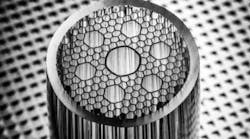Hollow Core Fiber from OFS Supports Quantum Cryptography Between Data Centers
Hollow core fiber from OFS was a cornerstone ingredient in a recent proof-of-concept experiment that demonstrated the ability to secure data using quantum cryptography. In addition to OFS/Furukawa, participants in the successful experiment included Iyntia, Nokia, LuxQuanta, ID Quantique, evolutionQ, and Digital Realty.
“The goal was to protect the integrity of a fiber-optic link between data centers and demonstrate that quantum cryptography is compatible with new hollow-core fiber-optic technology,” the organizations said in a statement announcing the successful trial. “It is also a globally leading initiative because of its interoperability of chained QKD [Quantum Key Distribution] manufacturers, which allows extending the distance between the data centers where encryption takes place. This is a breakthrough in terms of improved security to provide cryptographic protection against advancements in decryption by quantum computers, artificial intelligence, and machine learning.”
By securing a fiber-optic link from a Digital Realty data center, the group demonstrated on one leg of the connection the compatibility of quantum cryptography with hollow core fiber—“a new, very low-latency fiber-optic technology,” it added.
QKD “allows the secure exchange and generation of cryptographic symmetric keys between two locations protecting them by the laws of quantum physics,” the group explained. “This physical method does not rely on mathematical algorithms, offering a genuinely future-proof approach to information security which can be used alongside other cryptographic techniques to provide greater defense and resiliency.”
The group of companies that carried out this proof of concept described the experiment’s implications on data security: “Currently, the transmission of information is predominantly protected by asymmetric encryption protocols based on mathematical algorithms such as number factorization problems. However, advancements in machine learning, artificial intelligence, and quantum computing threaten the security of this cryptographic approach. In particular, it is estimated that, in the coming years, quantum computers will be able to break current cryptography based on mathematical problems with relative ease, putting the security of all digital communications of large companies at serious risk.”
In the test, two versions of QKD technology, from manufacturers LuxQuanta and ID Quantique, along with a quantum key management system from evolution, were used to protect data center access connections. Once the connection between the data center and the customer is secured with LuxQuanta’s system using the hollow core fiber, a second deployment of QKD systems is made via conventional fiber from Iyntia to extend the reach of the connection by “several tens of kilometers.”
Commenting on the role of hollow core fiber in the trial, OFS product line manager David Knight said, “This collaborative work demonstrates the unique advantages that hollow core fibers offer for distributing quantum keys along with the encrypted data stream. Successfully applying these technologies within a real-world data center interconnect proves their potential to enable future secure communications.”
On its website, OFS describes AccuCore HCF Optical Fiber Cable as “the world’s first terrestrial hollow core fiber cable solution. Light travels about 50% faster in a hollow core optical fiber compared to the solid silica core of conventional fiber. Consequently, light transmitted in a hollow core fiber arrives 1.54 microseconds faster for each kilometer traveled compared with conventional optical fiber.
“The AccuCore HCF Optical Fiber Cable solution includes indoor/outdoor cable termination with standard connectors, which are fusion-spliced to the patented photonic bandgap hollow core fiber. OFS offers installation services and both passive and active component selection to meet customer requirements. AccuCore HCF optical fiber cable has been successfully deployed, carrying live traffic in several networks.”
